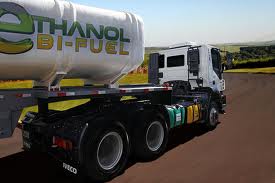Typically flex fuel vehicles are a combination of ethanol and gasoline or diesel and biodiesel. But inroads have been made to create flex fuel vehicles that use a combination of ethanol and diesel fuels. Iveco, FPT Industrial and Bosch officially debuted the Iveco Trakker Bi-Fuel Ethanol-Diesel vehicle at Agrishow last week in Ribeirão Preto, the country’s largest agricultural show.
The Takker contains an FPT Industrial Cursor 9 engine that can run on an ethanol and diesel mixture and is geared toward sugarcane and ethanol producers in the country. In early tests, the vehicle has successfully been using a 40 percent ethanol / 60 percent diesel blend and providing a 6 percent reduction in fuel costs. Development of the bi-flex vehicle began in 2010 with support from UNICA, the Brazilian Association of Sugarcane Producers and part of an ethanol industry “green policies” program.
 The next step is for the prototype to be tested by Raizen, a joint venture company between Cosan and Shell during the 2011 harvest.
The next step is for the prototype to be tested by Raizen, a joint venture company between Cosan and Shell during the 2011 harvest.
“We are still at the early stages of development and certainly we expect to reach a higher Ethanol-Diesel substitution rate bringing even lower operational costs,” said Renato Mastrobuono, Product Development Director for Iveco Latin America.
The Iveco Trakker Bi-Fuel prototype is a 6×4 truck used for 63 ton GCM that can be used in several applications on the sugar-cane plantations, such as articulated liquid tank transport. It uses a 360CvCommon Rail Cursor 9 engine. The truck has two tanks – one for ethanol and one for diesel- as well as an electronic control unit for each fuel, a pressure pump for the ethanol system and a lambda sensor for the exhaust manifold.
The ethanol is injected directly into the intake manifold during the admission stage. After the compression stage, the diesel is injected to promote combustion, and the system does not need any anti-knock additives.
“Another plus of the Bi-Fuel technology is that the engine can be fully reversed to diesel only application, which will make it easier to resell the vehicle after its use in the sugar-cane environment,” added Mastrobuono.

